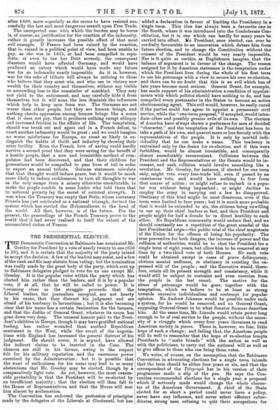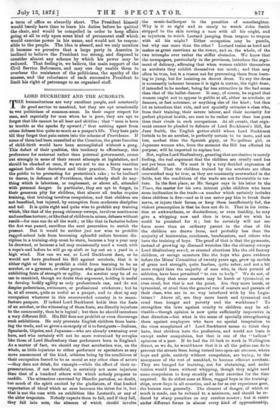THE PRESIDENTIAL ELECTION.
THE Democratic Convention at Baltimore has nominated Mr. Greeley for President by a vote of nearly twenty to one (656 to 38), and it is certain that the majority of the party intend to accept the decision. A few of the leaders may resist, and a few of the rank and file may abstain from voting; but the nomination was really made by the great body of the party, which sent up to Baltimore delegates pledged to vote for no one except Mr.
• Greeley. It is the popular voice within the party which has elected him rather than the leaders, and it is by a popular -vote, if at all, that he will be called to power. It is becoming clear as the struggle proceeds that the -Liberal leaders, the journalists excepted, are not hearty in his cause, that they -distrust his judgment and are . afraid of his tendency to favouritism ; but it is also becoming -clear that his name has a certain fascination for the farmers, • and that the dislike of General Grant, whatever its cause, has ,gone down very deep. The unusual honour paid to the Presi- -dent's children in Europe, though it may have gratified national feeling, has rather wounded than soothed Republican sentiment in the West, while the result of the negotia- tions with England has increased the general distrust of his judgment. He should never, it is argued, have allowed the indirect claims to be inserted in the Case. The chances are still in his favour, owing to the respect felt for his military reputation and the enormous power exercised by the Administration ; but it is possible that the want of enthusiasm for his name may lead to so many abstentions that Mr. Greeley may be elected, though by a comparatively light vote. As yet, however, the most reason- able probability is that the President will be re-elected by an insufficient majority ; that the election will then fall to the House of Representatives, and that the House will seat him almost by acclamation.
The Convention has endorsed the profession of principles made by the delegates of the Liberals at Cincinnati, but has after 1820 more especially as she seems to have resisted sue- I added a declaration in favour of limiting the Presidency to a single term. This idea has always been a favourite one in the South, where it was introduced into the Confederate Con- stitution, but it is one which can hardly for many years be carried into effect. No President, once elected, can ever be cordially favourable to an innovation which debars him from future election, and to change the Constitution without the consent of the President would be very nearly impossible. Nor is it quite so cerain, as Englishmen imagine, that the balance of argument is in favour of the change. The reason assigned for it by American statesmen is the temptation under which the President lives during the whole of his first term to use his patronage with a view to secure his own re-election, and there can be no doubt that this is an evil which has of late years become most serious. General Grant, for example, has made support of his administration a condition of appoint- ments with which politics should have nothing to do, and has compelled every postmaster in the States to become an active electioneering agent. This evil would, however, be easily cured if the parties could but agree to appoint a permanent civil service, while the "one-term proposal," if accepted, would intro- duce other and possibly greater evils of its own. The electors of America have always shown a preference for men of decided "character," and the temptation of the President has been to take a path of his own, and quarrel more or less fiercely with the representatives of the people. It is only by morbid indi- viduality that he can make a name. This tendency is restrained only by the desire for re-election, and if this were forbidden, would be almost irresistible, and consequently almost unendurably inconvenient. Collisions between the President and the Representatives or the Senate would be in- cessant, and each collision would involve something like a revolution. Mr. Greeley, for instance, if elected for one term only, might veto every free-trade bill, even if passed by an unanimous vote, and would have nothing to fear from that course of action ; or might refuse to embark in a popu- lar war without being impeached ; or might decline to employ the army in carrying out a law he disapproved. Obstinacy of this kind might be most disastrous, even if the term were limited to four years ; but it is much more probable that it would be extended to six, the citizens being unwilling to use up their chief leaders so fast, and then President and people might for half a decade be in direct hostility to each other. No Republican community would endure that, and we should constantly see a repetition of the great scandal of the last Presidential reign—the public trial of the chief magistrate of the Union for the offence of losing his popularity. The true preventive for both dangers, the increase of power and the collision of authorities, would be to elect the President for a single term of eight years, but allow him to be removed at any time by a two-third vote of both Houses. No such vote could be obtained except in cases of grave delinquency, obvious mental unfitness, or obstinacy in resisting the ex- pressed will of the people ; and the Executive would, there- fore, retain all its present strength and consistency, while it would still be subject to restraint and even coercion from the people in the last resort. The motive for the abuse of patronage would be gone, together with the temptation, which we believe to be at least as strong towards excessive individualism and contempt for popular opinion. No Andrew Johnson would be possible under such a system, for he would be removed, and no General Grant, supposing General Grant to be what Senator Sumner describes him. At the same time, Mr. Lincoln would retain power long enough to be of real service to the people, without the neces- sity of a struggle which every four years threatens to rend American society in pieces. There is, however, we fear, little hope of such a change ; and failing that, the American people will do well to remember that the hope of re-election tempts Presidents to "make friends" with the nation as well as with the politicians, to carry out the national will as well as to give offices to those who can bring them votes.
We write, of course, on the assumption that the Baltimore Convention in advocating elections for a single term intends that the term should be either four years or six, and that the correspondent of the Telegraph has in his version of their programme made a slip of the pen. He says the Con- vention recommended elections for a single year, a proposal which if seriously made would change the whole charac- ter of the American Government. A chief of the State elected for so short a period could never have a policy, never have any influence, and never select efficient subor- dinates, strong men refusing to quit their occupations for a term of office so absurdly short. The President himself would barely have time to learn his duties before he quitted the chair, and would be compelled in order to keep affairs going at all to rely upon some kind of permanent staff which would exercise power in his name, and would not be respon- sible to the people. The idea is absurd, and we only mention it because we perceive that a large party in America is inclined to believe the President too Strong, and disposed to consider almost any scheme by which his power may be reduced. That feeling is, we believe, the main support of the Civil Service Reformers, and may one day enable them to overbear the resistance of the politicians, the apathy of the masses, and the reluctance of each successive President to limit his right of patronage to an organised staff.



































 Previous page
Previous page